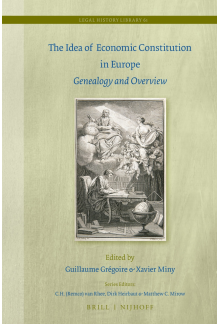- Titulinis
- Dalykinė ir mokslinė literatūra
- Teisės knygos
- Teisė, bendrieji dalykai
- The Idea of Economic Constitution in Europe: Genealogy and Overview
The Idea of Economic Constitution in Europe: Genealogy and Overview
Balsavo 0
ISBN: 9789004519336
Leidimo metai: 2022
Leidėjas: Brill | Nijhoff
Leidinio kalba: Prancūzų
Formatas: Kieti viršeliai
Formatas: 235×155
Leidimo metai: 2022
Leidėjas: Brill | Nijhoff
Leidinio kalba: Prancūzų
Formatas: Kieti viršeliai
Formatas: 235×155
Kaina:
Šių parametrų produkto neturime
Likutis pakankamas
Iš leidyklos gausime per 3-5 savaitės. Galimas vėlavimas
Turime sandėlyje. Pristatymas Lietuvoje 1-4 d.d.
Iš leidyklos gausime per 3-5 savaitės. Galimas vėlavimas
Pristatymo sąlygos
Aprašymas
Behind the controversies that have marked the history of the idea of Economic Constitution emerges the highly political issue of the room for manoeuvre left to public authorities in the economic sphere. The notion thus encapsulates a fundamental tension: between democracy and rule of law, which model of legal ordering of the economy should prevail?From physiocrats to neo-liberals, from the Weimar Republic to European integration, from national constitutions to Global Governance, this collective book invites us to explore the genealogy of the controversial concept of Economic Constitution. The result of this interdisciplinary dialogue is a comprehensive reflection on the legal and political issues at stake in the current constitutionalization of the market order in Europe.
Contributors are: Philippe Steiner, Guillaume Grégoire, Hugues Rabault, Peter C. Caldwell, Thomas Biebricher, Werner Bonefeld, Serge Audier, Vincent Valentin, Pieter van Cleynenbreugel, Xavier Miny, Frédéric Marty, Claire Mongouachon, Hans-Wolfgang Micklitz, Francesco Martucci, Michael Wilkinson, Hjalte Lokdam, Susanna Maria Cafaro, Peter Lindseth, Cristina Fasone, Pierre Nihoul, François Colly, Peter-Christian Müller-Graff, Tony Prosser, Damien Piron, Mahmoud Mohamed Salah, Stephen Gill, Thibault Biscahie, Sebastien Adalid, and Christian Joerges.
Derrière les controverses qui jalonnent l’histoire de l’idée de Constitution économique émerge la question éminemment politique de la marge de manœuvre laissée aux autorités publiques dans la sphère économique. La notion cristallise ainsi une tension fondamentale : entre démocratie et État de droit, quel doit être modèle d’organisation et d’ordonnancement juridique de l’économie?
Des physiocrates aux néolibéraux, de la République de Weimar à l’intégration européenne, des constitutions nationales à la Global Governance, cet ouvrage collectif nous invite dès lors à explorer la généalogie du concept polémique de Constitution économique. Les auteurs ouvrent alors, à travers un dialogue interdisciplinaire constant, une réflexion globale autour des enjeux juridiques et politiques du processus actuel de constitutionnalisation de l’ordre de marché en Europe.
Atsiliepimai (0)
Palikite atsiliepimą

